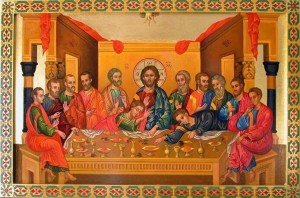What immediately takes place after the Epiclesis is the ANAMNESIS, that is the remembering. Anamnesis (from the Attic Greek word νάμνησις, meaning reminiscence or memorial sacrifice, is in Christianity, a liturgical statement in which the Church refers to the memorial character of the Eucharist or to a remembering of the Passion, Resurrection and Ascension of Christ. It has its origin in Jesus’ words at the Last Supper when He told his disciples to “Do this in memory of me.” In a wider sense, Anamnesis is a key concept in liturgical theology: in worship the faithful recall God’s saving deeds. This memorial aspect is not simply a passive process but one by which the Christian can actually enter into the Paschal mystery. It is based on a belief that when this particular event of Christ’s life is recalled – when He promised His disciples He would be with them for all days by being present in consecrated bread and wine – that He assured them He would be with them in a true and real sense. The celebrant begins our pray:
Remembering, therefore, this salutary command and all that was done in our behalf: the cross, the tomb, the resurrection on the third day, the ascension into heaven, the sitting at the right hand, the second and glorious coming again, we offer to You, Yours of Your own, in behalf of all and for all.
and all then respond:
We praise You, we bless You, we thank You, O Lord, and we pray to You, our God.
At this point we raise the transformed gifts as a gesture of offering them to God in thanksgiving. Our gifts truly represent human life as found not only in Jesus but in all humankind.
Two things are important to note in our Anamnesis. First we remember Christ’s “second and glorious coming again”, something that has not yet happened in time but which has happened in eternity, remembering that in God there is no time and all is in the present moment.
Second we say in our Anamnesis that we offer to God “Yours of Your own.” This truly acknowledges that the life-force that calls us and keeps us in existence is none other that God’s own life-force. So in essence we offer back to God that which He has given us as a gift. We declare, by this action and prayer, that we truly thank Him for the gift of life – for being the source of our very existence.

